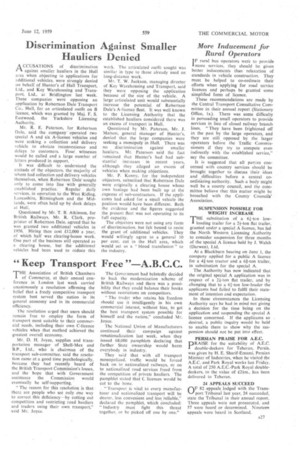Discrimination Against Smaller Hauliers Denied
Page 29

If you've noticed an error in this article please click here to report it so we can fix it.
ACCUSATIONS of discrimination against smaller hauliers in the Hull area when objecting to applications for additional vehicles, were strongly denied on behalf of Hunter's of Hull Transport, Ltd., and Key Warehousing and Transport, Ltd., at Bridlington last week. These companies were opposing an application by Robertson Dale Transport Co.. Hull, for an articulated outfit on B licence, which was granted by Maj. F. S. Eastwood, the Yorkshire Licensing Authority.
Mr. R. E. Paterson, for Robertson Dale, said the company operated two special A and six A-licence vehicles and were seeking a collection arid delivery vehicle to obviate inconvenience and delays to customers. Four, witnesses would be called and a large number of letters produced in support.
It was difficult to understand the attitude of the objectors, the majority of whom had collection and delivery vehicles themselves, when Robertson Dale sought only to come into line with generally established practice. Regular daily services, in operation to the West Riding, Lancashire, Birmingham and the Midlands, were often held up by dock delays at Hull,
Questioned by Mr. T. B. Atkinson, for British Railways, Mr. R. Clark, proprietor of Robertson Dale, agreed that he was granted two additional vehicles in 1956. Hiring then cost £12,000 a year, of which half was clearing-house work. One part of the business still operated as a clearing house, but the additional vehicles had been used to reduce this work. The articulated outfit sought was similar in type to those already used on long-distance work.
Mr. T. W. Jackson, managing director of Key Warehousing and Transport, said they were opposing the application because of the size of the vehicle. A large articulated unit would substantially increase the potential of Robertson Dale's A-licence fleet. It was well known to the Licensing Authority that the established hauliers considered there was an excess of transport in Hull.
Questioned by Mr. Paterson, Mr. J. Matson, general m. anager of Hunter's, denied that the large companies were seeking a monopoly in Hull. There was no discrimination against smaller hauliers. Mr. Paterson said the fact remained that Hunter's had had substantial increases in recent years, although they alleged an excess of vehicles when making objections.
Mr. P. Kenny, for the independent objectors, submitted that Robertson Dale were originally a clearing house whose own haulage had been built up at the expense of sub-contractors. If the applicants had asked for a small vehicle the position would -have been different. Both the evidence and the figures suggested the present fleet was not operating to its full capacity.
The objectors were not using any form of discrimination. but felt bound to resist the grant of additional vehicles. They would willingly agree to a general 10 per cent, cut in the Hull area, which would act as a " blood transfusion" to the industry.




















































































